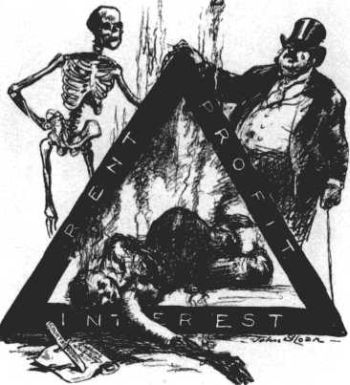
Publisher:
Bonnie King
CONTACT:
Newsroom@Salem-news.com
Advertising:
Adsales@Salem-news.com

~Truth~
~Justice~
~Peace~
TJP
Mar-23-2011 20:57

 TweetFollow @OregonNews
TweetFollow @OregonNews
Rhetoric Unchanged in Century Since Triangle Fire
Salem-News.com100 Years After New York City’s Triangle Waist Fire, Industry Still Fights Regulations.
 Image source: www1.assumption.edu |
(NEW YORK) - Industry Fought Commonsense Regulations in Wake of Fire; Public Citizen Notes Same Rhetoric Used in Today’s War on Safeguards.
The event leading to the creation of many workplace safety regulations is nearing its 100th anniversary, yet many of the same industry concerns voiced then echo today.
On March 25, 1911, 146 garment workers - most in their teens and 20s - died after a fire broke out at the Triangle Waist Company in New York City. In the wake of the tragedy, the New York Legislature passed laws requiring mandatory fire drills, automatic sprinklers, unlocked doors during work hours, doors that swing outward and many other reforms that today we take for granted.
But no matter how commonsense those regulations sound now, when they were first proposed a century ago, industry interests called them overly burdensome - the same rhetoric we are hearing today. They called sprinklers “cumbersome and costly” and warned that the new laws would drive “manufacturers out of the city and state of New York.”
If that sounds familiar, it’s because it is. Massey Energy is the Triangle Waist Company of today, similarly warning that the sky will fall if we institute safety rules for coal mining. If today’s House Republicans were alive in 1911, they would have called sprinklers “job killers.”
The anniversary of the Triangle Waist Company fire is a great time to highlight the importance of our health and safety rules, and to compare the hyperbolic rhetoric of industry today to 100 years ago. Big business made dire predictions about going out of business if it had to pay a minimum wage, make sure factories were not fire traps and avoid using children.
Discussing the number of people killed in factory fires, a New York City real estate man and the voice of business on the Factory Investigating Commission said, “It is an infinitesimal proportion of the population.”
When a fire prevention expert told one employer in June 1909 - less than two years before the fire - to institute fire drills, he said, “Let ‘em burn. They’re a lot of cattle anyway.”
And when sanitation certificates were proposed for bakeries, the president of the New York Flour Club said, “Such [sanitary] certificates will give a possible opportunity for an unfair person to make demands for graft on the small baker … [They] would have the effect of gradually reducing rather than increasing the number of small bakeries.”
Responding to the implementation of a minimum wage, the director of the largest canning company in New York said, “I wonder do the American people ever stop to realize that these social uplifters are one of the chief causes of the high cost of living. If they had their way, a can of tomatoes instead of costing 12 cents would cost at least 50 cents. This is the inevitable result of their endeavors.”
To read more historic quotes from industries opposed to basic safeguards after the Triangle fire, visit: citizen.org/documents/Triangle-Fire-Anniversary-20110323.pdf.
To speak to an expert about the industry’s current attempt to block or scrap health and safety safeguards, contact one of the numbers above.
Source: Public Citizen, a national, nonprofit consumer advocacy organization based in Washington, D.C.
 |
Articles for March 22, 2011 | Articles for March 23, 2011 | Articles for March 24, 2011


Quick Links
DINING
Willamette UniversityGoudy Commons Cafe
Dine on the Queen
Willamette Queen Sternwheeler
MUST SEE SALEM
Oregon Capitol ToursCapitol History Gateway
Willamette River Ride
Willamette Queen Sternwheeler
Historic Home Tours:
Deepwood Museum
The Bush House
Gaiety Hollow Garden
AUCTIONS - APPRAISALS
Auction Masters & AppraisalsCONSTRUCTION SERVICES
Roofing and ContractingSheridan, Ore.
ONLINE SHOPPING
Special Occasion DressesAdvertise with Salem-News
Contact:AdSales@Salem-News.com


googlec507860f6901db00.html
Terms of Service | Privacy Policy
All comments and messages are approved by people and self promotional links or unacceptable comments are denied.
[Return to Top]
©2025 Salem-News.com. All opinions expressed in this article are those of the author and do not necessarily reflect those of Salem-News.com.